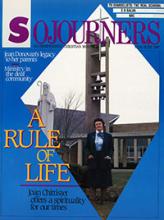Now the works of the flesh are plain: immorality, impurity, licentiousness, idolatry, sorcery, enmity, strife, jealousy, anger, selfishness, dissension, factions, envy, drunkenness, carousing, and the like....But the fruit of the Spirit is love, joy, peace, patience, kindness, goodness, faithfulness, gentleness, self-control; against such there is no law. -Galatians 5:19-23
The high and unholy public drama being played out by the nation's leading television evangelists should put to rest any lingering fear that the Christian media might not be as entertaining as the real thing. "Days of Our Lives," "General Hospital," and "The Young and the Restless" have all taken a back seat to the emerging soap-like scandal that has embroiled and embattled many of the most celebrated TV preachers. Overwhelmed, and now overcome, by the traditional temptations of money, sex, and power, the media ministers-turned-media moguls have displayed, before the eyes of the nation, behavior that is at the same time absurd, disgusting, and just plain tasteless.
"We're ashamed, we're embarrassed, we're humiliated, and we're dismayed about all these problems surfacing in the media across the nation," lamented Rev. G. Raymond Carlson, who heads the pentecostal Assemblies of God denomination, in which two of the principle combatants in the present crisis, Jim Bakker and Jimmy Swaggart, are ordained ministers. Carlson speaks for many in the pentecostal and fundamentalist Christian communities, from which the TV evangelists draw most of their viewers, but also for the wider evangelical movement and even the broader church.
Read the Full Article

